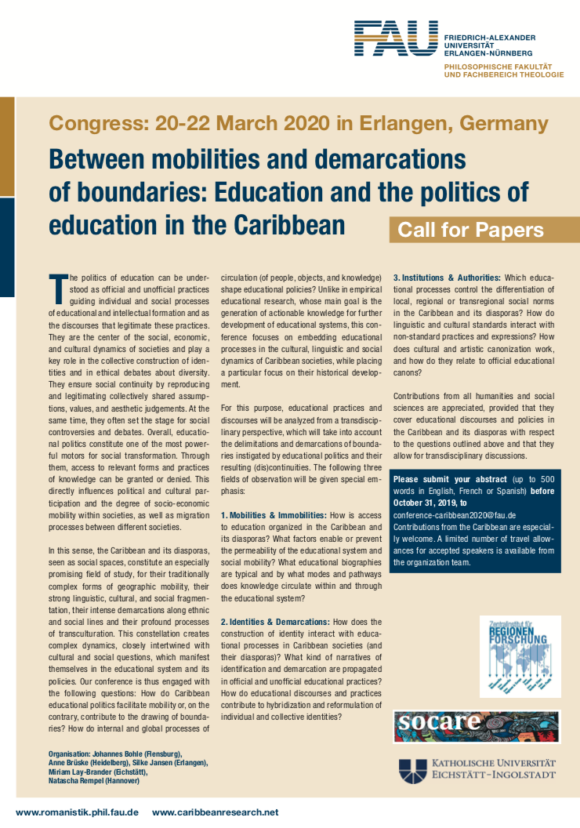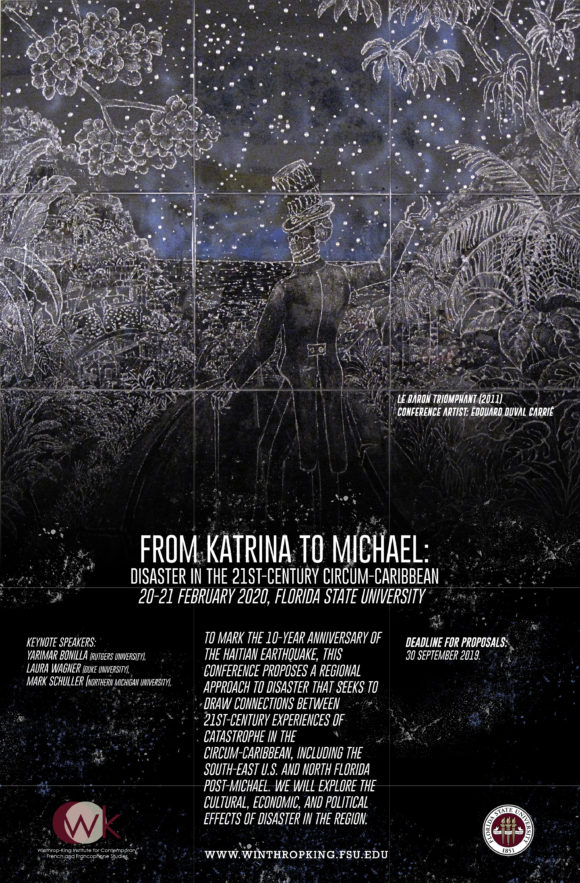What: 42nd Annual Conference on West Indian Literature
When: 9-12 October 2024
Where: University of the West Indies, St. Augustine, Trinidad and Tobago
Abstracts: 300 words or less due by 31 May 2024
Conference Theme: “Making Us Better Than We Think We Could Be”?: Alternative Identities and Technologies
From the organizers:
Our theme this year acknowledges Professor Edward Baugh’s legacy. Through his creative work and scholarship spanning over fifty years he gave us opportunities to reflect upon ourselves as Caribbean people, and he provided a testament to our resilience and spirit. The quotation in the conference title is from his poem “It was the Singing” beloved for its authentic Caribbean voice and for a cadence that lifts readers and fills them with a sense of security and promise. His work demonstrates his lifelong commitment to “making us better than we think we could be.”
The promise conveyed in the poem is also implied in the sub-theme, “Alternative Identities and Technologies,” which anticipates the transformation we seek—transformation that reflects the protean nature of Caribbean identity. Today, global interchange and exchange encourage a continual reassessment of our place in the world and of ourselves in our own space. Contentious global issues such as immigration, populism, nationalism, inclusivity, our relationship with the environment, sexual citizenship, comprehensive sexuality education, social justice, indigenous peoples’ rights and human rights generally, resonate with us in the Caribbean and across the Caribbean diaspora. In addition, within these places / spaces, the literary output and scholarly criticism addressing LGBTQIA+ themes; societal issues, policies and debates surrounding gender diversity; and the inclusion of non-binary / non-gendered / gender neutral pronouns in affirming one’s gender identity are examples which reflect our changing and widening views in the Caribbean, although liberal and alternative views are variously rejected, accepted, or tolerated because of our heterogeneity.
The defining and shaping of Caribbean identities are further influenced by the opportunities for their metamorphoses presented by existing and emerging technologies. The evolution of Caribbean identities gestates between the algorithmic codes and frequencies that breathe life into digital communities, virtual assistants, artificial intelligence software, virtual reality, and brain-computer interfaces within the current technoscape. However, for as many ways that these technologies offer the means for creating and (re)inventing positive alternative identities, there are just as many ways that algorithmic biases and digital exclusions contour and create alternative identities that can be viewed as technological Othering. Therefore, engaging the questions embedded in this year’s conference theme involves not only considering the positive ways in which technology can enable the creation and proliferation of Caribbean identities, but also the necessary measures that need to be considered to ensure that possibilities for alternative identities are not detrimental to their present manifestations.
As we engage in this annual conference which is now beyond its fortieth year, we explore to what extent we have become better. The Baugh quote allows for us to consider the varied and continued means by and ways in which we continue to transform our existence as Caribbean and diasporan peoples.
The conference invites papers that include but are not limited to topics such as:
-
- Belonging & Unbelonging
- Identity & Authorship (including questions of ownership of images, digital alternations, photoshopping and the (re)fashioning of identity)
- Literature and the Evocation of Experiential Selves
- Oral Literatures
- Reinventing & Remediating the Caribbean Past
- LGBTQIA+ Identities
- Avatars & the Exploration of Desired and Feared Selves
- Inclusivity and the Differently Abled • Identities in Transit (related to issues of migration)
- Crime & Criminality
- Regional Links
- Mental Health and Disorders
- Hybrid Identities
- Caribbean “Schizophrenia” (including theories by Walcott, Deleuze, Guattari, among others)
- Indigenous Peoples & Languages
- Caribbean Sports
- Literature in Science / Science in Literature
- Recalibrating Religion & Spirituality
- Reconceptualising Race
- Dougla Poetics
- Caribbean Political Landscapes
- Caribbean Fantasy, Speculative and Science Fiction
- Caribbean vs West Indian
- Storyworlding Caribbean Scapes
- Beyond the Postcolonial
- Virtual Assistants/Assistance (such as Siri, Alexa, Chatbot, Chat GPT)
- Digital Identities in the Technoscape
- Impact of Technology on Teaching and Learning
- Digital Cultural Production & Storytelling (especially digital poetry, AI & VR narratives, cyberliterature)
- The Cultivation of Digital Communities
Presentations may be in any of the formats listed below.
-
- Formal Presentation using any medium – 20 minutes
- Poster Session – presentation/display space limited to 1.5m x 1.5m
- Panel Discussion – three or four papers encompassing a range of perspectives on an issue • Round Table – 20-minute informal presentation settings
- Performance – drama, film, audio recording, etc.
- Workshop – practical, interactive sessions limited to 2 hours
We welcome presentations from scholars and practitioners who are involved or interested in research, discussions or activities that reflect these and other topics.
Please submit an abstract of not more than 250 words and a short profile (approximately 150 words). Identify the topic and presentation type, and include information on resources that would be required.
Deadlines:
May 31st, 2024 Deadline for submission of abstracts
June 15th, 2024 Deadline for notification of acceptance
Submissions should be sent to: Conference Email: WILitConf42@sta.uwi.edu Enquiries should be sent to: Dr Geraldine Skeete Geraldine.Skeete@sta.uwi.edu and/or Dr Karen Sanderson Cole Karen.Sanderson-Cole@sta.uwi.edu Continue reading CFP: 42nd Annual Conference on West Indian Literature





